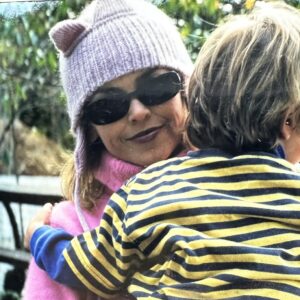The boy has finally found a sport he likes. After years of trying football, basketball, and baseball, he tried Lacrosse a few weeks ago and has been happily running around the fields of Maine, New Hampshire, and Massachussetts for weeks now. When he played football last year, I secretly called him Ferdinand, the bull who would rather smell the flowers in the field than fight in bullfights.
I often worry about raising my gentle son: how will I keep him safe? How can I protect him? Is he strong enough to survive heartbreak? Tough enough to endure the slings and arrows of life? Is there a way for me to help him stay open-hearted and full of love, while also being indestructible?
When I was his age, my favorite song to play on the piano was a crazy country “talking-song” by Johnny Cash called “A Boy Named Sue.” Well, Johnny Cash sang it, Shel Silverstein wrote it. (It’s amazing to me that the same person who wrote “A Boy Named Sue,” also wrote “The Giving Tree.”) The song is about a furious boy who spends his entire life fighting people who make fun of his name, until one day he runs into his father, the son-of-a-gun who named him. They end up brawling in the street, and the father says go ahead and kill me, but first you should thank me because “I knew you’d have to get tough or die, and it’s that name that helped to make you strong.” I don’t know why I loved this song so much. Maybe it was the surprising wordplay — I didn’t know any other songs that described street fights with such rollicking word play, like “some girl would giggle and I’d get red, some guy would laugh and I’d bust his head;
or “I’ve fought tougher men, but I really can’t remember when he kicked like a mule and bit like a crocodile.”
I also didn’t know any other humorous songs about naming a boy. I love thinking about names and how they might impact a person—do they become the name, fight the name, discard the name and choose their own? I named my cat Pazzo Amore Bambaino which means “Crazy Love Baby” in Italian, but the cat was truly crazy, and I thought maybe if I started calling “Muffin” he’d quit biting me… it didn’t work, but that does remind me of my cat in high school, Romeo. With a name like Romeo, one would think he would be a swooning adoring cat, but no, when I’d sit down on the porch to pet him, he’d purr and rub against my leg for a moment before he’d suddenly turn around and bite me and run. Damn cat. And before you start to think cats just like to bite me, I have two cats now, Monk Marshmallow and Princess Cream Puff, who have never bit me.
I named my son Henry Dashiell Emerson after three of my favorite writers: Thoreau, Emerson, and Dashiell Hammett. Just last week he was asking me how to spell his middle name, Dashiell. (What 16-year-old doesn’t know his middle name?) When he was little, he confused his middle name with flying reindeer and when people asked his name he’d say, “Henry Dasher Prancer.”
So in the song, “A Boy Named Sue,” the father, who abandoned his family years ago, says, “Son, this world is rough and if a man’s gonna make it he’s gotta be tough.”
I actually agree with this lyric, but I don’t have a clue how to make someone “tough.”
Like most parents, my number one goal has always been to protect my children, to keep them safe, but life had other plans for us, and we spent years being pummeled by a series of staggering losses. It’s a powerless feeling as a parent to watch an onslaught of heartbreak rain over your children.
I can assure you that none of us feel “tough” in our grief, but there are other things here. Grief has given us a delicate gift we never asked for, but received anyway.
The delicate gift of grief is a growing compassion for the world around us.
I know this, but I’m an adult. I wonder if my kids know this. I carefully watch my son in his day-to-day life to make sure he’s okay. In between his obsession with fluffing his hair just right and playing mindless games on his phone, I see him respond to the world around him in a way that is the opposite of “tough.” When he sees an elderly woman struggling with her garbage cans, he hops out of the car and runs through the snow to help her carry them. When his friends experience profound loss, he doesn’t shy away or wish them well from afar … he shows up. Maybe he doesn’t know what to say, or do, (do any of us really?) but he does know how to put his arms around someone in grief.
He knows what it’s like to lose big.
Over the holidays, I took Henry to see my Mom.
(Sidenote: It was my Mom who made me take piano lessons my entire life, and I wonder if she regretted it when she heard me playing and chuckling as I belted out, “A Boy Named Sue” over and over. Maybe that’s what finally drove her crazy all these years later — her memory of me singing that song. But she’s not crazy, I’ll take that title. She has dementia, and her brain no longer allows her to remember who we are.)
We walked into the Memory Care Center and tried not to buckle under the sadness of it all. We wheeled my Mom into the sun room, my sisters, niece, Henry and I, and Henry read one of her favorite books to her: The Berenstain Bears. My Mom was a schoolteacher for years and loved reading to children. Now, even without knowing who we are, one of the ways I connect to her is reading picture books to her. And she can actually still read them aloud to herself.
I encouraged Henry to sit across from her so she could see him. I wondered if any part of her might remember him. He looks different now—he’s taller, bigger, with a deeper voice. She always had a soft spot for Henry. She would say, “There’s something so endearing about him.” Henry sat down, knees touching hers, holding out his hands, palms up, so she could rest her hands on his.
I envisioned her lovingly laying her hands on his palms, a sweet tender moment, but no, that’s not what happened.
Things took a terrible turn.
She kept tapping his hands in an uncomfortable way, making faces, like she was trying to say something, like she was feeling angry or uncomfortable.
We couldn’t understand what she was trying to say, so we kept guessing.
“She’s communicating with you! She’s playing some kind of game! Maybe she recognizes you! She’s … ”
She lifted a hand like she was shaking a fist.
“Mom,” Henry said. “I think she needs to go to the bathroom.”
My Mom continued with her silent tirade, not noticing what had happened.
My sister ran to grab the nurse for help.
In a flurry, the nurses took her away to put her into clean clothes and in the sun room, we all talked and tried to pretend that the cold grip of dementia hadn’t wrapped its ugly fist around our hearts and squeezed.
How could we not understand our Mom? What sign did we miss? Did I just scar my son forever with this experience? What is she even doing here? Why can’t she come home with us? What kind of life is this for her? Are any of us tough enough to handle this?
None of us knew how to respond, so I patted Henry’s back and my sisters talked to him about school, trying to push away what just happened.
When my Mom returned, it was time for her lunch. She stared into space as all of us hugged her goodbye and trailed behind her while Henry took her wheelchair and pushed her to her table. I walked towards the front door and turned around, waiting for him.
I watched him gently move her chair closer to her plate. Instead of dashing after me, I watched him set the chair just right and lock the wheels to keep her safe, while my niece tenderly fastened her bib around her neck. He put his big teenage boy arms around her and hugged her goodbye.
I tilted my head watching him. I can’t protect him. Life is full of slings and arrows: always has been, always will be. What do you say to a teenage boy who’s adoring grandmother can’t remember him?
I don’t need to toughen him up, life will do that with no help from me. So I don’t have a clue what I’m teaching him, except to keep walking and take note of the miracles all around us at all times, because those are the things that get us through.
Henry walked to me at the front door of the Memory Care, and we stepped outside, into the bracing mountain air and overpowering scent of pine trees.
In the last few years, whenever people ask Henry what he’s thinking for college, he says, “Community.” When they ask what he wants to do when he grows up, he says he wants to be a librarian or work with old people by day, and be a bartender by night. I’m not sure if he still wants to work with old people after this distressing visit, but maybe it will inspire him even more. You never know. I sure as hell don’t.
Anyway, it seems to me Henry is just the right amount of tough, but I know that can change. If I have learned anything in life it is that nothing is forever, except one thing: love.
At least it feels like it’s forever and that’s good enough for me.






















